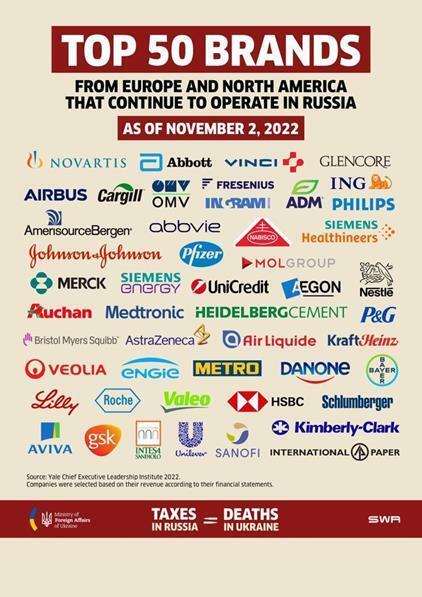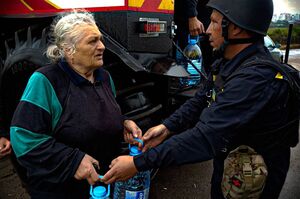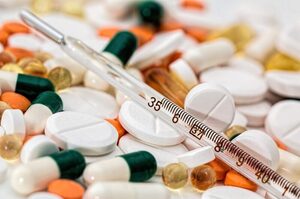"Without you all": Could there be a shortage of imported medicines in Ukraine?
Medicines produced by the aggressor country and its satellite, belarus, are under sanctions and banned for supply to Ukraine. Are patients going to feel the lack of "aggressive" medicines and will pharmaceutical companies benefit?
The law banning russian- or belarus-produced medicines was adopted by the Verkhovna Rada at the end of May. Amendments to the law "On Medicinal Products" providing for the restriction of circulation of such pharmaceuticals in Ukraine were voted for by 338 MPs.
The law came into force on June 8 and its practical implementation began right away. It implies authorizing the relevant authorities to cancel the state registration of medicinal products if one, several or all stages of their production are done by enterprises whose production facilities are located in russia or belarus.
Furthermore, the state registration of pharmaceuticals may be cancelled if the manufacturing company is engaged in direct or indirect production of pharmaceuticals in these countries.
So far, the Registration Certificate Termination Commission within the Ministry of Healthcare of Ukraine has formed a list of the first 35 medicinal products that are to be suspended due to the manufacturer's connection with the russian federation. The list includes drugs produced by the Hungarian company Gedeon Richter, in particular, that continues to work actively in russia in spite of the war.
The first moves to clear the market of russo-belarusian pharmaceuticals sparked a wave of criticism of the law. For example, MP Oleksandra Ustinova, Head of the Golos ('Voice') parliamentary group, said that Ukraine is going to face a "humanitarian catastrophe", patients will face a scarcity of medicines, including the most vital ones, and the law itself can be used to "clean up" the market.
Mind studied the pharmaceutical companies that continue to operate both in Ukraine and russia, and whether Ukrainians are really threatened with a shortage of medicines if the latter are not allowed to enter the Ukrainian market.
What can be substituted for sanctioned drugs? Given the importance of the industry affected by the law, the legislator has provided a number of precautions that should prevent the creation of gaps in delivering necessary medicines to the people.
First of all, the law does not apply to original medicines that have no analogues. A drug to be theoretically withdrawn from the market needs to have at least three or more alternatives available.
Mind has carried out an analysis to see how critical the withdrawal of drugs with a "russian link" may be for the domestic market. The study of the Ministry's of Healthcare database with regard to the drugs subject to withdrawal indicates that the "presence reduction policy" can be compensated by averagely five Ukrainian analogues for each product under sanctions.
As for the drug substance, there are no cases when the russian-belarusian drug would have no alternative.
The case of the mentioned "ban list" of 35 drugs by the Hungary's Gedeon Richter suggests that each of them has three to more than 30 alternatives. At the same time, manufacturers of some alternative drugs are also foreign companies that are leery of leaving the russian market.
| Drug | Active Ingredient | Number of alternatives on the market (total) | Ukrainian Alternatives | Alternatives produced by companies that have not left the rf market |
| NORMODIPINE 10 mg | Amlodipine | 17 | ALÀDIN®-FARMAK | Amlodipine (KRKA, Slovenia) |
| Amlodipine-Astrapharm | ||||
| Amlodipin-Darnitsa | ||||
| Amlodipine-Zdorovye | ||||
| AMLODIPINE-KV | ||||
| AMLODIPINE-Farmak | ||||
| NORMODIPINE 5 mg | Amlodipine | 23 | ALÀDIN®-FARMAK | Amlodipine (KRKA, Slovenia) |
| AMLODIPINE | ||||
| Amlodipine-Astrapharm | ||||
| Amlodipin-Darnitsa | ||||
| Amlodipine-Zdorovye | ||||
| AMLODIPINE-KV | ||||
| AMLODIPINE-Farmak | ||||
| AMLODIPINUM-FITOFARM | ||||
| Samlopin® | ||||
| CALUMID | Bicalutamide | 8 | - | - |
| STUGERON | Cinnarizine | 4 | CINNARIZIN | - |
| Cinnarizinum "OZ" | ||||
| CINNARIZIN SOPHARMA | ||||
| CINNARIZIN | ||||
| FORTE | ||||
| TEBANTIN ® | Gabapentin | 7 | Gabantin 300 | - |
| Gabapentin | ||||
| Epigaba | ||||
| MEDYTAN | ||||
| NUROPENTINE® | ||||
| Groprinosin ® | Inosine pranobex | 6 | GROPIVIRIN | - |
| GROPRIM | ||||
| Inosine pranobex | ||||
| NOVIRIN | ||||
| Raenom 5 mg | Ivabradine | 6 | BRADIUM® | Bravadin® (KRKA, Slovenia) |
| Raenom 7,5 mg | Ivabradine | 6 | BRADIUM® | Bravadin® (KRKA, Slovenia) |
| Zilola ® | Levocetirizine | 19 | L-MAI | Allerway |
| L-CET® | (Dr. Reddy's India) | |||
| Alergolik | CEZERA® | |||
| Ergocetal | (KRKA, Slovenia) | |||
| Sezonia | ||||
| LEVOCETIRIZINE-ASTRAPHARM | ||||
| Diroton® 10 mg | Lisinopril | 12 | LISINOPRIL | - |
| LISINOPRIL-ASTRAPHARM | ||||
| LIPRIL | ||||
| Diroton® 20 mg | Lisinopril | 12 | LISINOPRIL | - |
| LISINOPRIL-ASTRAPHARM | ||||
| LIPRIL | ||||
| Diroton® 5 mg | Lisinopril | 10 | LISINOPRIL | - |
| LISINOPRIL-ASTRAPHARM | ||||
| LIPRIL | ||||
| Co-Diroton® 10 mg | Lisinopril and diuretics | 9 | Lizinoprazid | - |
| LISINOPRIL-N | ||||
| Lisopres 10 | ||||
| Liprazidum 10 | ||||
| STATORAM®-Í | ||||
| Co-Diroton® 20 mg | Lisinopril and diuretics | 7 | Lizinoprazid | - |
| LISINOPRIL-N | ||||
| Lisopres 20 | ||||
| Liprazidum 20 | ||||
| STATORAM®-Í | ||||
| SENTOR® 50 mg | Losartan | 11 | SENTOR® | Lozartan (KRKA, Slovenia) |
| SENTOR® 100 mg | Losartan | 11 | SENTOR® | Lozartan (KRKA, Slovenia) |
| CO-SENTOR® 50 mg | Losartan and diuretics | 7 | - | ËÎÇÀÐÒÀÍ 100 / Hydrochlorothiazide 25 (KRKA, Slovenia) |
| Lorista® Í (KRKA, Slovenia) | ||||
| ÊÎ-ÑÅÍÒÎЮ 100 mg | Losartan and diuretics | 3 | - | Lozartan 100 / Hydrochlorothiazide 25 (KRKA, Slovenia) |
| Lorista® Í 100(KRKA, Slovenia) | ||||
| Lorista® ÍD(KRKA, Slovenia) | ||||
| Singlon® 4 mg | Montelukast | 15 | ASMONT | - |
| MONTEL | ||||
| Singlon® 5 mg | Montelukast | 17 | ASMONT | - |
| MONTEL | ||||
| Singlon® 10 mg | Montelukast | 17 | ASMONT | - |
| MONTEL | ||||
| Nifuroxazid Richter (suspension 220 mg) | Nifuroxazide | 4 | Nifurozid-Zdorovye | - |
| Nifuroxazide | ||||
| NIFUROXASID-VISHPHA | ||||
| Nifuroxazid Richter (tablets 100 mg) | Nifuroxazide | 4 | Nifuroxazide | - |
| STOPDIAR (capsules 200 mg) | Nifuroxazide | 7 | Nifurozid-Zdorovye | |
| Nifuroxazide | ||||
| Nifuroxazide-Sperco | ||||
| AMLODIPIN-PERINDOPRIL-RICHTER | Perindopril and amlodipine | 5 | Am-Aliter | AMLESSA (KRKA, Slovenia) |
| BI-PRENELIA | Perindopril 4 / Amlodipine 10 (KRKA, Slovenia) | |||
| Perindopres® À | ||||
| Perindopril 4 / Amlodipine 5 KÐKA (KRKA, Slovenia) | ||||
| Perindopril 8 / Amlodipine 10 (KRKA, Slovenia) | ||||
| Perindopril 8 / Amlodipine 5 (KRKA, Slovenia) | ||||
| MERTENIL 5 mg | Rosuvastatin | 34 | AVOID | ROSVATOR (Sun Pharmaceutical Industries, India) |
| ROSUVASTATIN IC | ||||
| MERTENIL 10 mg | Rosuvastatin | 34 | AVOID | REDISTATIN (Reddy's Laboratories Ltd, India) |
| Clivas10 | ROSVATOR (Sun Pharmaceutical Industries, India) | |||
| Lipretto | ||||
| ÎÇÀËÅÊÑ® | ||||
| ÏÐÅВÅÍÒÎÐ | ||||
| ÐÎDzÑÒÅЮ | ||||
| Rosuvastatinum | ||||
| Rosuvastatinum IC | ||||
| Rosuvastatinum-Darnitsa | ||||
| Rosuvastatinum-Mikrokhim | ||||
| MERTENIL 20 mg | Rosuvastatin | 21 | AVOID | REDISTATIN (Reddys Laboratories Ltd, India) |
| Clivas 20 | ROSVATOR (Sun Pharmaceutical Industries, India) | |||
| Lipretto | ||||
| OZALEX® | ||||
| PREVENTOR | ||||
| Rosister® | ||||
| Rozuvastatin | ||||
| Rozuvastatin IC | ||||
| Rosuvastatinum-Darnitsa | ||||
| Rosuvastatinum-Mikrokhim | ||||
| TERBISIL cream 1 mg | Terbinafine | 4 | Lamicon® | ÅÊÇÈÔ²Í (Dr. Reddy's Laboratories Ltd., India) |
| Lamicon® DERMGEL | ||||
| Lamifen® | ||||
| PREDIZIN® tablets 35 mg | Trimetazidine | 5 | Trimetazidine-Darnitsa | - |
| Trimetazidin-Astrapharm | ||||
| Cardasin-Zdorovye | ||||
| Carductal | ||||
| TRIDUCTANI MR | ||||
| Tricard |
According to the Ministry of Health of Ukraine, Apteka.ua
Be noted that the level of presence and integration into the russian market may be different for various manufacturers – from the reduction of their presence to the minimum possible in terms of life-saving medications to a conscious decision in favour of excess profits. As a rule, the Ministry of Health takes these aspects into account when imposing bans on the products by such manufacturers
International pharmaceutical companies that continue to work in/with russia
| Company's name | Country and area of production | Level of "presence reduction" and in what stages/when it took place | Level of interaction/dependence between the Ukrainian office and the russian office | Level of financial interaction with the parent company | Official and unofficial opinins of employees |
| B.Braun | Germany, production of medical devices | Since the beginning of the full-scale war, it has continued its work in the russian market | Not related. A separate office and a separate legal entity – B. Braun Medical Ukraine was created for Ukraine | Financed directly by the parent company | - |
| Dr. Reddy’s | India, production and sales of medicines | The company officially announced that it has no plans to leave the russian market. | There is no direct interaction with the russian office. | The Ukrainian "global" office is subordinated to the head office. |
A member of the Ukrainian office Inna G. calls russia a "terrorist state" and is against its aggression. |
| Fresenius | Germany, a medical company | The company’s head Stefan Sturm officially stated that they will not leave the russian market because "it is a matter of life and death" for their patients. | The company's global website does not list an office in Ukraine. Instead, there is a regional office in moscow, which deals with marketing. | The company has a Ukrainian office and a legal entity in Ukraine – Fresenius Medical Care Ukraine. Subordination to the headquarters is direct or indirect (through the moscow office). |
An employee Ingo Elefering published information on providing assistance to Ukrainian refugees, thereby supporting Ukraine against russia’s aggression |
| Gedeon Richter | Hungary, manufacture of medicinal and pharmaceutical products | Officially stated that they continue to work in the russian market, because they "cannot leave our patients without our medicines." | Medicines produced in GR RUS (the company's plants in russia) are sold not only throughout the russian federation, but also supplied to the CIS countries (Kazakhstan, Belarus, Uzbekistan, Moldova, Ukraine, Kyrgyzstan and Armenia). | The company has a Ukrainian office, which most likely reports directly to the head office. | - |
| KRKA | Slovenia, medicine production | Continues to operate in the russian market since the beginning of russia's full-scale war against Ukraine | No direct interaction with the russian office. | The company has a Ukrainian office, it reports directly to the head office. | - |
| Siemens Healthineers | Germany, medical devices | Siemens Healthineers CFO Jochen Schmitz said that the company considers it its duty to continue working in russia despite the curtailment of projects under sanctions. He assured that he would not allow Siemens CT scanners to be used to treat russian soldiers. But the company does not intend to refuse to treat children with cancer. | No direct interaction with the russian office. | The company has a Ukrainian office, it reports directly to the head office. | Company employee Claudia Oanea supports Ukrainian colleagues and refugees |
| Sun Pharma | India, pharmaceutical company | Refused to leave the russian market. | There is no direct interaction with the russian office. | The company has a Ukrainian office, it reports directly to the head office. | - |
Life-saving medications used, for example, in the treatment of cancer, tuberculosis, HIV/AIDS therapy, and other serious conditions also cannot be banned by this law, regardless of the country of their origin.
"Based on preliminary estimates by analytical companies, in terms of trade names, the minimum number of drugs that will fall under this law is about 2% of the whole market. It is 0%, if looked in the context of the active ingredient, " says Iryna Bondarchuk, an expert in the pharma industry.
The practice strictly adheres to the letter of the law. All drugs that have already been deprived of registration have dozens of analogues produced by both Ukrainian and other foreign pharmaceutical manufacturers. For example, Normodipine tablets produced by Gedeon Richter can be replaced by one among over 20 other products with the same active ingredient. Mertenil tablets have more than 30 alternative drugs that are available in any pharmacy.
Obviously, a temporary ban on the use of one among dozens of similar medications cannot bring negative effects to patients, threaten their health or treatment protocols. But along with that, certain changes in the market of medicinal products will occur due to the reform of the legislation, but they affect only certain market players. These are individual pharmaceutical companies that continue their operations in russia.
Why medicines? On November 7, the Ministry of Foreign Affairs of Ukraine published a list of 50 international companies that continue to operate in russia nine months after the outbreak of the aggressive war. Such businesses are complicit in war crimes in Ukraine and the genocide of Ukrainians through the taxpaying system that finances aggressor's armed forces, among other things.
"Again, I call on their customers and partners to boycott these brands until they stop making bloody profits and leave russia," said Dmytro Kuleba, head of the Ministry.

Every fifth company on the list is either pharmaceutical or medical.
"Foreign pharma-companies explain their ongoing work in russia by humanitarian purposes. But this is a lie. 90-97% of the drugs they sell can be replaced by russian manufacturers," explains Taras Potichny who represents the NGO Pharmagate.
For example, among all active ingredients or combinations in the composition of the Slovenian KRKA corporate group's medicines that are imported to the russian federation, only 8 out of 105 are "essential" and not produced in the rf. The situation is similar with the drugs of the Berlin-Chemie. Only 10.7% of their preparations on the russian market are classified as "essential".
That is, to continue to work in russia is a deliberate business decision, not a gesture of humanism, to which the Ukrainian legislator adequately responded with sanctions.
"This law is a sanitary measure to prevent companies that openly support and will support their activities in russia from selling their medicines in Ukraine's market. In doing so, Ukrainian patients will not suffer, because it is about drugs that have dozens of alternatives. Where is the problem, if paracetamol produced by a pro-russian company disappears from the market tomorrow?" adds Potichny.
How will the restrictions affect the pharmaceutical market in the future? The scale of "redistribution" of the market is estimated by experts as being moderate, again, due to the large number of comparables to the removed drugs. Thus, if 1 out of 10 similar medications with previously relatively equal market shares disappear, the remaining 9 medicinal products will receive only 1% of the market additionally. In fact, this share will be even smaller, because drugs that have not 10 but dozens of analogues are usually the ones that lose their way to pharmacy shelves.
According to the study by Proxima Research, which was presented in the summer, foreign pharmaceutical companies may generally lose about 6% of the market in monetary terms. But to be understood, as of year-end 2021, foreign pharma had a 66% share of the market in money terms, while providing only a third of the drug consumption by Ukrainians, if counted in packages.
Will other, particularly domestic, players benefit from this? To a minimum, because the scope of challenges the industry faced during the war cannot be compensated simply by withdrawing a few drugs with multiple substitutes.
"The sales of medicines in monetary terms collapsed by about a quarter. We have lost millions of consumers, a part of the market in the occupied areas, and logistics has suffered greatly. Those 1-2%, which we might be able to compensate for with the help of this law, are a drop in the ocean," comments the head of a Ukrainian pharmaceutical company on condition of anonymity, adding that any allegations about "targeted market cleansing" do not withstand fact checking, "Patients will not suffer in any way. And manufacturers can stop working on the russian market and return to Ukraine at any time. The choice is theirs."
If you have read this article to the end, we hope that means it was useful for you.
We work to ensure that our journalistic and analytical work is of high quality, and we strive to perform it as competently as possible. This also requires financial independence. Support us for only UAH 196 per month.
Become a Mind subscriber for just USD 5 per month and support the development of independent business journalism!
You can unsubscribe at any time in your LIQPAY account or by sending us an email: [email protected]






